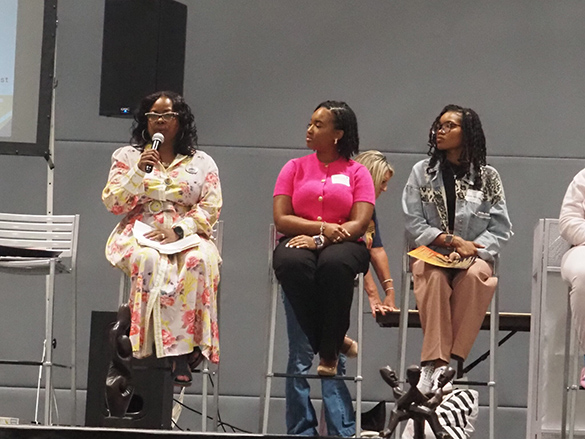State officials, mental health advocates, and community members gathered Saturday in Rocky Mount for the Stronger Together conference, North Carolina’s first event centered on the state’s Black Youth Suicide Prevention Action Plan. The gathering featured community-driven solutions to one of the most pressing public health challenges facing Black youth.
The plan comes as suicide rates among Black youth and young adults have risen sharply nationwide. In North Carolina, from 2013 to 2022, 377 Black North Carolinians ages 10 to 24 died by suicide, according to state data.
Nearly 17% of Black high school students said they had seriously considered suicide, while more than a third of middle schoolers reported the same. The numbers peak at age 24 — and are especially stark for Black girls questioning their sexual orientation, who now report the highest rates of suicide attempts in schools statewide.
“This is about empowering communities and tapping into their inherent strengths,” said Kelly Crosbie, director of the state’s Division of Mental Health, Developmental Disabilities and Substance Use Services. “I would much prefer that kids get the support they need well before they have a crisis.”
In her speech on Saturday, Crosbie noted youth ages 10 to 18 are now the largest group calling the national 988 crisis hotline, a statistic she described as both “good and shocking.”
The conference drew dozens of participants despite early funding challenges. Dr. Rodney Harris, who coordinated the event, described it as the product of grassroots persistence. “We’re creating a coalition that saves lives,” Harris said in a speech. “This is love in action, because this is the essence of community and family.”
The day included workshops, a documentary screening, and panel discussions led by young advocates. Panelists spoke candidly about the stigma surrounding mental health in Black communities, particularly the pressure on young men to suppress emotions. They urged peers to seek connection rather than isolation.
“Being vulnerable or asking for help does not make you weak. It actually makes you stronger,” said Nautica McCoy, a member of the North Carolina Black Youth Wellness Advisory Board, during a panel discussion.
Judith Beth VanBoven, who also serves on the state’s youth advisory board, told the audience that sharing their experiences can help others. “Your testimony will become a legacy that someone else will learn from,” she said.
Rafiah Maxi Cole, founder of Sole Survivors of Chicago, also took part in the panel discussion.
She spoke with NC Newsline ahead of the conference, sharing her own story of loss. In 2020, her 19-year-old son died by suicide. “I wanted to be vocal about learning more about what happened,” she said.
Maxi Cole has since dedicated her life to prevention efforts, producing the documentary “While the Children Fade” and leading community outreach in nontraditional spaces — from laundromats to bus stops.
“We must meet the community where the community is,” she said. “Street outreach is the best outreach.”
She praised North Carolina’s action plan as an important step in reducing the stigma around mental health struggles. “To recognize that Black youth are surpassing any other ethnicity when it comes to suicide ideations and attempts brings about an awareness,” she said in earlier interview. “It’s time to humanize this subject.”
Throughout the day, speakers framed suicide prevention as a collective responsibility. Brandon Johnson, who leads a national Black youth suicide prevention initiative, said in his speech that “this is an act of love, an act of hope, an act of resilience. We care deeply about each and every one of you.”
Community members also shared stories of local resilience. Corey Kent, a barber student at Edgecombe Community College, described how his decision to pursue barbering became a form of service. On Saturday, he was offering free haircuts both as a way to hone his skills and connect with neighbors. “Write your dreams out. Don’t ever stop chasing them,” Kent said.
Organizers said that the initiative’s success depends on grassroots involvement. Efforts include training barbers and other community members to recognize warning signs of depression, as well as providing culturally responsive care.
Despite political uncertainty surrounding diversity initiatives, organizers said the community-led approach makes their work resilient. “When the community and the village embrace the work, it can’t be stopped,” said Dr. Sonyia Richardson, a UNC Chapel Hill researcher who helped developed the state plan.
The plan will focus on the 17 counties with the highest suicide rates, while maintaining a commitment to reach all 100 counties in North Carolina.
For Crosbie, the stakes could not be higher. “Suicide is now one of the leading causes of death among youth,” she said. “But prevention is possible when we build safe spaces and strong networks of support.”

